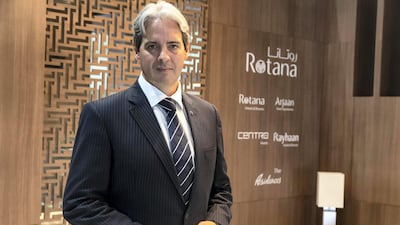Abu Dhabi-based hotel management group Rotana is looking to expand its foot print in Saudi Arabia, an "underserved" market that offers a huge potential for growth, its president and chief executive said.
"Saudi Arabia is a critical market for us," Guy Hutchinson, told The National on the sidelines of Arabian Travel Market in Dubai. "I could see Saudi Arabia growing to the scale that we have in the UAE … we see multi-city, multi-brand rollout."
The company currently operates seven properties in the kingdom and has five hotels in the pipeline.
Rotana, which manages properties across the Middle East and Africa under its Arjaan, Rayhaan, Centro and The Residences brands, currently generates about 50 per cent of group revenue from the UAE market, where it has 36 properties with 10,012 rooms.
Saudi Arabia and other markets in the GCC, Turkey, Africa and the Middle East account for the rest of the business.
In the UAE, however, Rotana is looking at a more measured expansion. The market is “well-served” and the company wants to be “careful” about where it opens new properties, Mr Hutchinson said.
The UAE hospitality market is not saturated and there is room for expansion, however, the group is focused on delivering returns to developers and tends to be asset and investment return-centric in its approach to growth, he said.
“Growth is important to us and we do have an aggressive pipeline over the next two to three years. [However,] our strategy tends to differ a little bit as we are still very investor-focused, and when we expand it has to be in a measured way,” Mr Hutchinson said.
The company saw strong occupancy across its UAE hotels last year despite pandemic headwinds. The country has fared better than some of its peers, recording the world's second-highest hotel occupancy last year.
It hosted 14.8 million guests that pushed hotel occupancy rates to 54.7 per cent, according to World Tourism Organisation. That outpaced the global average occupancy rate of 37 per cent and the Middle East’s 43 per cent.
“In Dubai where we had caps, we have been limited to 70 and 80 per cent, but we have managed to achieve whatever the cap allowed us to do,” he said. “In Abu Dhabi, occupancy levels remained even higher.”
The higher occupancy trend continues this year, however the main objective for Rotana in 2021 is to increase its revenue per available room – a key performance measure for the hospitality industry.
“The key for the bounce [back] this year is to get the [room] rates back to 2019 level. [In terms of] occupancy, we are more or less there,” Mr Hutchinson said.
A full recovery of Rotana’s portfolio to pre-pandemic level is likely to take place by the end of 2022, and the continued mass inoculation campaign and safety measures in place will further accelerate the speed of recovery, he said.
“Outside of Australia and New Zealand, we probably have the safest operating platform in the world,” he said.
A surge in domestic tourism and longer terms stays last year, enabled the company to keep its 68 hotels in 14 countries operational through the pandemic. However for a full recovery it would need Western Europe, predominantly the UK and Germany, its biggest source markets, to bounce back.
“We had an element of domestic consumption, which was incredibly important to us,” Mr Hutchinson said. The number of guests also surged last year as soon as Dubai and the broader UAE opened to international visitors.
Rotana also saw a bounce back in Saudi Arabia with a surge in domestic leisure and business travel as international travel was banned by the kingdom to stop the spread of Covid-19.
“Domestic tourism and domestic corporate [sector] is fuelling a lot of occupancies”, which will be further supported with the inbound traffic, he said.


